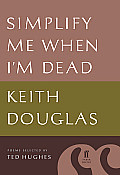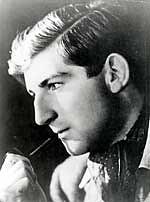 Keith Douglas has largely ceased to exist to most readers beyond those attracted to war as a subject. The reissue of Simplify Me When I’m Dead, containing forty-one poems, aims to correct that.
Keith Douglas has largely ceased to exist to most readers beyond those attracted to war as a subject. The reissue of Simplify Me When I’m Dead, containing forty-one poems, aims to correct that.
Simplification means to cut out details in order to make clear. Without it, we couldn’t describe our trip to Paris or the plot of a movie, give directions or write a recipe. Without it, we’d be like those cartographers in Borges who make maps the same size as the regions they depict, which are accurate but useless. Because we use simplification as short hand for the real thing, we hold in contempt those who mix up concision with lying, politicians and biographers especially. Nobody—no matter what Facebook thinks—wants to be generalized, living merely on the perceptions of others, to be, like Prufrock, “pinned and wriggling on the wall.” Being reduced to certain traits or demographic categories, as if these represent the total person, is in some sense wounding, even fatal.
In the title poem from Simplify Me When I’m Dead, Keith Douglas makes the connection explicit, imagining how he’ll be remembered when his body decays to its irreducible bones:
Of my skeleton perhaps
so stripped, a learned man will say
‘He was of such a type and intelligence,’ no more.
There are two ways to read this: That Douglas will be regarded as no more than a certain kind of person, his multifarious being reduced to a few impressions or characteristics. The other possibility is that he will simply no longer exist except as a figure of limited historical interest, inescapably trapped in the years between his birth and death.
 Both meanings end up hitting the mark. “Fine poets have a right to inhabit fine skins, and Douglas was blond and handsome.” So writes Lawrence Durrell in his 1966 introduction to Alamein to Zem Zem, Douglas’s engrossing account of his adventures as a tank commander in North Africa during World War II. (Douglas later died in Normandy, a few days after D-Day.) Durrell states that Douglas “loathed rhetoric and affectation” and then proceeds to fix the memory of his subject—despite the memoir’s slipperiness—in some bathetically affected rhetoric: “How wise he was! He took things as they were, extracting every ounce of experience from them…. Everything was enjoyable, even fear, horror and physical discomfort.”
Both meanings end up hitting the mark. “Fine poets have a right to inhabit fine skins, and Douglas was blond and handsome.” So writes Lawrence Durrell in his 1966 introduction to Alamein to Zem Zem, Douglas’s engrossing account of his adventures as a tank commander in North Africa during World War II. (Douglas later died in Normandy, a few days after D-Day.) Durrell states that Douglas “loathed rhetoric and affectation” and then proceeds to fix the memory of his subject—despite the memoir’s slipperiness—in some bathetically affected rhetoric: “How wise he was! He took things as they were, extracting every ounce of experience from them…. Everything was enjoyable, even fear, horror and physical discomfort.”
But Douglas has also largely ceased to exist to most readers beyond those attracted to war as a subject. (My Norton Anthology of British Literature gathers him with other “war poets”). The reissue of this slim volume, containing forty-one poems, aims to correct that. Originally published in 1964, twenty years after the poet’s death, and selected by Ted Hughes, these poems demonstrate a range of skill and subject matter most people don’t master in a lifetime of writing, let alone by age twenty-four, Douglas’s age when killed. He composed the enchanting opening lyric, “Encounter with a God,” when he was fifteen or sixteen, and while its Poundian influences are unmistakable, the fact that a teenager can even have Poundian influences is astonishing.
Less sure-footed when he gets philosophical (“Words are my instruments but not my servants”), Douglas’s best poems are marked by lucid, unfussy images. And his war poems are something else entirely. His father fought in the Great War, and while at Oxford, Douglas trained in the mounted calvary before switching to tanks. Military life was the major current directing his attention, and writing of its object—combat—fires his perception:
Now in my dial of glass appears
the soldier who is going to die.
He smiles, and moves about in ways
his mother knows, habits of his.
The wires touch his face: I cry
NOW. Death, like a familiar, hearsand look, has made a man of dust
of a man of flesh.
The formal control of these lines moderates, chillingly, the violence they depict, evincing the detachment and clarity of voice found in much of the work here, which weds the prosodic rectitude of First World War patriot-poets, like Rupert Brooke, whom Douglas admired, to the unsparing gaze of Wilfred Owen and Hemingway. Recurrent is the confrontation between vestiges of the old, noble ideals of the battlefield and the democratic brutality of modern, mechanized warfare. Perhaps the best known of Douglas’s poems, “Aristocrats” embodies this confrontation by breaking halfway through from fairly regular four and five beat lines into a more dynamic free verse:
The noble horse with courage in his eye,
clean in the bone, looks up at a shellburst:
away fly the images of the shires
but he puts the pipe back in his mouth.Peter was unfortunately killed by an 88;
it took his leg away, he died in the ambulance.
I saw him crawling on the sand, he said
It’s most unfair, they’ve shot my foot off.How can I live among this gentle
obsolescent breed of heroes, and not weep?
Unicorns, almost,
for they are fading into two legends
in which their stupidity and chivalry
are celebrated. Each, fool and hero, will be an immortal.These plains were their cricket pitch
and in the mountains the tremendous drop fences
brought down some of the runners. Here then
under the stones and earth they dispose themselves,
I think with their famous unconcern.
It is not gunfire I hear, but a hunting horn.
Dying here is not just men (and the constraints of traditional verse), but a way of life that understands, quaintly, war as governed by the same rules of fair play and honor as a cricket match. Douglas’s sharply drawn lyrics highlight how radically—and rapidly—our world has changed in the past century, a span when ideals—no matter how misguided—codified in Homer and adopted throughout Western Civilization were overtaken by technology. Which is worse, claiming that a man can’t lead until he’s battle-tested, or believing (with some condescension) that soldiers drawn from the lower classes have no free will, no choice but to fight and die, pointlessly? In both cases, the people calling the shots are not taking the shots. In the book’s last poem, Douglas writes, “The next month, then, is a window / and with a crash I’ll split the glass,” a reminder that the great simplifier for all the actors, soldiers and civilians alike, is death.




